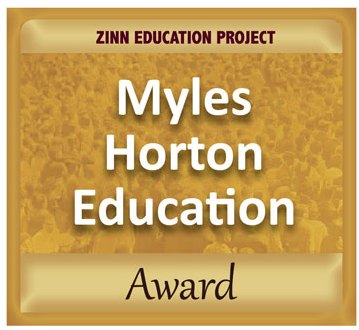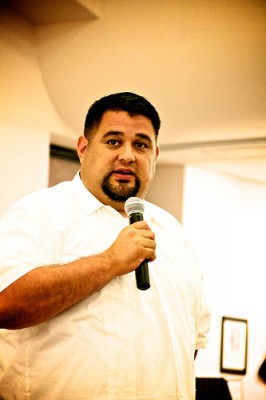 Washington, D.C. (April 2, 2012) – The Zinn Education Project announced the recipient of the 2012 Myles Horton Education Award for Teaching People’s History. The award is named for Myles Horton, one of the most influential educators in the 20th century. Myles Horton was co-founder of Highlander Folk School in Tennessee, famous for its pivotal role in desegregation efforts, and a tireless advocate for education and civil rights. In 1961, segregationists attempted to close Highlander on trumped-up charges, to which Horton replied: “A school is an idea, and you can’t padlock an idea.”
Washington, D.C. (April 2, 2012) – The Zinn Education Project announced the recipient of the 2012 Myles Horton Education Award for Teaching People’s History. The award is named for Myles Horton, one of the most influential educators in the 20th century. Myles Horton was co-founder of Highlander Folk School in Tennessee, famous for its pivotal role in desegregation efforts, and a tireless advocate for education and civil rights. In 1961, segregationists attempted to close Highlander on trumped-up charges, to which Horton replied: “A school is an idea, and you can’t padlock an idea.”
This award honors those who promote democracy through education by ensuring that students have the knowledge and skills to be informed and active participants in their communities, country, and the world.
The 2012 Myles Horton Award for Teaching People’s History honoree is Sean Arce, co-founder and director of the Mexican American Studies program in Tucson, Ariz. The Zinn Education Project is delighted to honor Sean Arce for his instrumental role in nurturing one of the most significant and successful public school initiatives on the teaching of history in the United States. (The Mexican American Studies program was featured on The Daily Show on April 2.)
“Tucson’s Mexican American Studies program gets it absolutely right: Ground the curriculum in students’ lives, teach about what matters in the world, respect students as intellectuals, and help students imagine themselves as promoters of justice,” explains Zinn Education Project co-director Bill Bigelow. “I’m thrilled that the Zinn Education Project is able to honor the work of Sean Arce by recognizing him with the first Myles Horton Award for Teaching People’s History. Mr. Arce has begun work that we hope will be emulated by school districts throughout the United States.”
The Zinn Education Project is joined by many educators, writers, and policy makers in our respect for the invaluable achievements of Sean Arce.
“At a time when students, particularly students of color, are accused of being apathetic about education, Sean Arce, a teacher and director of the Ethnic Studies program of the Tucson Unified School District, refutes this claim loudly and beautifully. Given the widespread mean-spirited and false attacks on the program from right-wing politicians who have resisted even visiting the program, Sean Arce stands out as an educator who speaks truth to power. He has inspired young people to love, to pursue their dreams, and to work for the betterment and uplift of their communities. As one young man in the film Precious Knowledge so beautifully said, ‘This space saved me.’ Sean Arce’s work is a welcome antidote to the cynicism about young people and a testament to the power of education.” —Sonia Nieto, Professor Emerita, Language, Literacy, and Culture, School of Education, University of Massachusetts, Amherst
“Sean Arce has been a steadfast pillar of an outstanding program that was unlike what he had access to as a student. Under his co-leadership, more than 6,000 students, the majority being Latino, have been served by a program producing a consistent graduation rate of more than 90 percent, at a time and in a state in which Latino students complete school at a much lower rate. His work and accomplishments on behalf of social justice for Arizona’s youth merit the highest tribute.” —Christine Sleeter, President, National Association for Multicultural Education
“The Mexican American Studies program in TUSD has been a resounding academic success and affirmation of the diversity of our nation and our community. Sean Arce, as a teacher and as director of MAS, has been key to the success of the program and to the very necessary ongoing effort to save it. He has helped lead the program to a standard of excellence that we all continue to admire, and he will help lead it back to that same standard when these politically motivated attacks on students and education are just a bad memory.” —U.S. Rep. Raúl M. Grijalva (AZ-07)
“As co-founder and director of the MAS program, Sean Arce developed a culturally relevant program that speaks to students who have felt unseen and marginalized and inspired and motivated them in their education, to know their own history, engage actively in their own learning, and connect in meaningful ways to the larger community. I applaud the Zinn Education Project for honoring this dedicated educator committed to promoting the study and understanding of issues of social justice.” —Myla Kabat-Zinn, daughter of Howard Zinn
“Over the past decade, Sean Arce, the esteemed director and co-founder of the district’s Mexican American Studies program, has created and instituted a nationally acclaimed curriculum with a host of other scholars that has reversed troubling dropout rates among Latino students, and overseen one of the most successful academic programs in the state. When the White House Hispanic Community Action Summit came to Tucson two weeks ago, in fact, Arce emerged as one of the most esteemed voices—as a respected parent, beloved educator, and trusted community member—at the gathering. In a family that traces its roots back to the city’s 18th-century founders, Arce’s longtime involvement and commitment have not gone unnoticed by thousands of students, parents, and community leaders.” —Jeff Biggers, author/journalist
“Sean Arce is a hero and a viral educator.” —Luis Alberto Urrea, 2005 finalist for the nonfiction Pulitzer Prize.
The Myles Horton Education Award will be presented at a special ceremony at Busboys and Poets in Washington, D.C., at the beginning of the 2012–13 school year. Busboys and Poets owner Andy Shallal explained, “In these days when so few education reform efforts demonstrate real impact, the Ethnic Studies program that was headed by Mr. Sean Arce hit a bull’s-eye with a 93 percent success rate. We are delighted to honor the founder and host the award ceremony.”
Background on Sean Arce

Sean Arce. Photo courtesy of Save Ethnic Studies.
Sean Arce’s father was a glazier and ironworker whose union struggles gave Sean his first taste for social justice. His mother worked as a translator, giving voice to those unable to speak English as they navigated the U.S. legal and financial worlds. Both instilled in him a sense of service to others.
After playing football at San Jose State, Arce came to the University of Arizona. At his wife’s suggestion he began to take Mexican American studies classes, and his world changed. “It was highly engaging for me,” he says. “I began to make connections and to establish a greater understanding of my history. It really inspired me.”
Arce worked with others to create the Ethnic Studies program at the Tucson USD at the K-12 levels. “The actual planning took place with university students and community folks,” he notes. “We created this understanding of why it’s so important to have culturally and historically relevant education in Tucson. We understood the dropout rate, and the abysmal history of Mexican American education. I heard stories from my parents about their Americanization. Students’ names were Anglicized, they were hit for speaking Spanish, and there was a tracking system [a practice where children of color are put in classes that are not college bound, such as industrial arts], so they didn’t have the same educational opportunities I had.”
At its essence it was a grassroots effort accompanied by a solid academic plan. Arce and the framers of the program did the research as to how to make the material age appropriate and meaningful for the students. Since Arce started in 1999, the program grew from a single American History Mexican American Perspective class to some 44 high school-level classes throughout TUSD, and more at the elementary level.
The Mexican American Studies program, documented in the film Precious Knowledge, has been under attack from the state legislature and from the state superintendent of schools. Arce has played a central role in the public, legal, and political campaigns to reinstitute this invaluable program.
About the Zinn Education Project
The Zinn Education Project promotes and supports the use of Howard Zinn’s best-selling book A People’s History of the United States and other materials for teaching a people’s history in middle and high school classrooms across the country. Founded with the support of Howard Zinn, the project is coordinated by two nonprofit organizations, Rethinking Schools and Teaching for Change. Close to 20,000 teachers from every state are registered for the project, 25,000 teachers visit the website each month, and more than 75,000 teachers receive the project news.
The project’s goal is to introduce students to a more accurate, complex, and engaging understanding of U.S. history than is found in traditional textbooks and curricula. Zinn’s A People’s History of the United States and Voices of a People’s History of the United States emphasize the role of working people, women, people of color, and organized social movements in shaping history. Students learn that history is made not by a few heroic individuals, but instead by people’s choices and actions, thereby also learning that their own choices and actions matter.
We believe that through taking a more engaging and more honest look at the past, we can help equip students with the analytical tools to make sense of—and improve—the world today.






Twitter
Google plus
LinkedIn